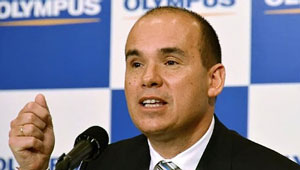Remember, he not only uncovered an $1,7 billion Olympus accounting fraud that cost the Japanese camera-to-endoscope maker Olympus its board and reputation. He also uncovered the infamous side of corporate Japan that Olympus quickly wants to forget. Now Michael Woodford, the ousted Olympus chief executive, has reached an out-of-court settlement with his former employer for unfair dismissal on grounds of whistleblowing and uncovering one Japan’s biggest corporate frauds.

Woodford is said to seek $60 million in the suit. There is talk of a $15.4 million settlement.
It was a degrading exit for Woodford — who turned the humiliation into a campaign of professional vengeance. Woodford was seeking compensation for up to ten years lost earnings at CEO level after he was sacked on October 14, 2011,, ejected from his apartment and told to take the bus to the airport after just weeks in the top job.
Woodford has said that after an Olympus board meeting at which he was not allowed to speak. He was told to vacate his Tokyo apartment, return his laptops and telephones and take the bus.
Olympus insisted — what a classic — that Woodford was sacked because the 30-year company veteran failed to understand its management style and Japanese culture.
Over the following weeks, regulators uncovered an accounting fraud stretching back over more than a decade.
Olympus’ entire corporate structure turned out to be so corrupt that there was no way Woodford could have done anything to change things at the company.
Woodford abandoned his attempt to launch a board coup and regain his CEO position in January after failing to win the backing of Japanese shareholders. He blamed cosy ties between its management and big local investors.
The settlement is subject to approval by Olympus’s board when it meets on June 8, and it the event the board does not ratify the deal, the case will be reopened.
Speaking after the tribunal, Mr. Woodford said according to the Financial Times: “Hopefully today is closure. A line has been drawn and the company can move on – and I can too. We think [the potential settlement] is positive and in the interests of both parties. I genuinely hope that, in the interests of Olympus, it helps them move forward.”
Mr. Woodford had previously made clear that he would not agree to a settlement that prevented him from speaking publicly about his time at Olympus.
The Liverpool-born chief executive initially campaigned to be reinstated as chief executive following his dismissal, before announcing plans to take legal action against Olympus in January.
Since his disclosures, Olympus’s board has been partially replaced and the accounting scandal has been investigated by a number of bodies, including the U.K. Serious Fraud Office and the U.S. Federal Bureau of Investigation.
Olympus’s share price fell by more than 80% in the wake of the scandal and is still half its pre-scandal level.
After initially denying wrongdoing, Olympus admitted that it had been stashing lossmaking securities investments in the Cayman Islands and other offshore centers since the early 1990s.
The acquisitions, for which Olympus intentionally overpaid, had been part of a complex scheme to square its accounts. In February, seven people were arrested in connection with the fraud — arrests that prove, according to Woodford, that corporate Japan needs a cleanup.
Nevertheless Olympus is still able to churn out high quality cameras, just to mention the OM-D E-M5.
Woodford plans to publish a book in English about his experiences. For the moment he has more important things than Olympus on his mind. Ater reaching the settlement he said he would return to his seaside home in south eastern England: “I’m going sailing this afternoon.”
It is understood that the Woodford case sends a strong ethical and professional message to Japanese corporate managers. Observers though say the only things Japanese companies will learn from this is a) don’t put a foreigner in such a position and b) payout before things get really, really ugly.


